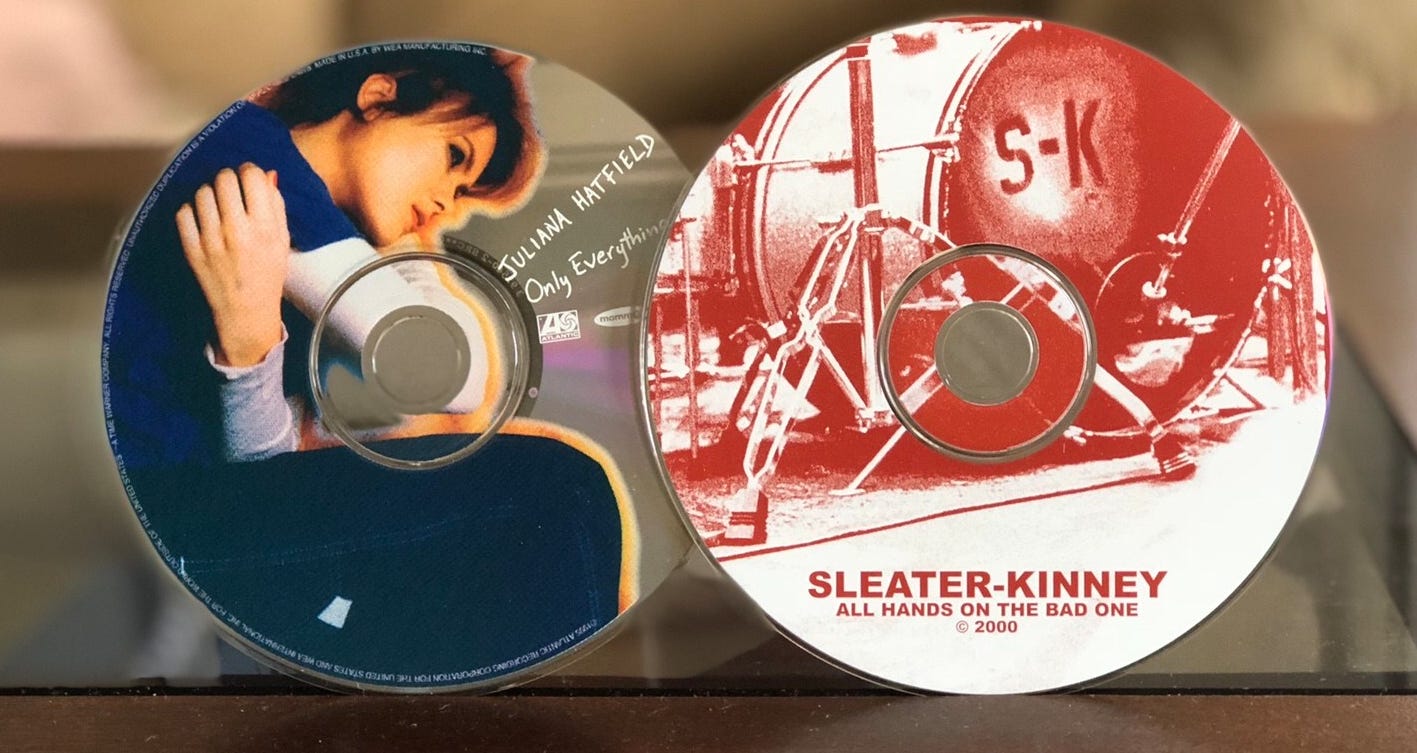These are my records: Juliana Hatfield and Sleater-Kinney
Juliana Hatfield: Only Everything (1995) and Sleater-Kinney: All Hands On the Bad One (2000)

It’s easy to forget now, but the 1990s were supposed to be the End of History. The threat of sudden nuclear obliteration arriving and raining down on us faster than Domino’s could bring us a pizza—one that we Generation Xers had lived with our entire lives—was suddenly just gone, and in the ten-year interregnum between the collapse of the Soviet Union and the fall of the Twin Towers, we never quite managed to figure out what we were supposed to do with ourselves.
Juliana Hatfield wasn’t singing about the end of history on her 1995 album Only Everything, but I’ve always thought it neatly captures the overall feel of the moment: Mostly confident but still tentative in places, looking inward instead of out at the broader world, trying to shed the cynicism that by then had come to define her (and my) generation. Her deceptively fragile-sounding voice gives her lyrics a sense of innocence from the first track, but at the same time she is neither too scandalized by your behavior nor too jaded to call you out on your crap in front of everyone. Which she does on the very first track, "What a Life:" Wasted, ruined, tragic 'cause it doesn't have to be like this, she sings, and you can almost see her glaring at Courtney Love and Scott Weiland, crouched together in the back of the room, as if a good public shaming would have made any difference.
There’s not much of a sense of innocence on Sleater-Kinney’s All Hands on the Bad One, recorded just as the '90s were wrapping up and released the following year. By that point, we’d endured boy bands and spice girls and the spectacle of spurious impeachment and three—yes, THREE—World Series wins for the New York @*#%!ing Yankees, so it's little wonder we'd gone right back to being jaded again. It is, however, still an inward-looking album, the difference being that here the focus is on the we instead of the me, one that circles back a few times to the subject of women's roles in the music industry specifically and American society more broadly. It doesn't say much for us as a society that the album's feminist politics still sound very contemporary more than 20 years later.
AHOTBO delivers fourteen tracks pulsing with energy (it helps to have a drummer as good as Janet Weiss) and sonic creativity in just 37 minutes. The band uses a palette that’s markedly different from Hatfield’s to give each track its own distinct identity: where Hatfield relies almost exclusively on her fuzzed-out guitar tone and her fantastic chops, Sleater-Kinney stir things up more, mixing aggro rockers like “Youth Decay” with the dreamlike swirl of “The Swimmer” and the funkier groove and canny harmonies of “Milkshake and Honey.” But even with the diversity of styles on offer, all the songs seamlessly fit within the framework of the album itself and the late '90s ideal of indie-punk rock, and there's not a weakling in the bunch.
Above: Janet Weiss, badass.
Only Everything also clocks in at fourteen songs but drags them out across 51 minutes, which is about four songs and fifteen minutes too long. The ‘90s were the age of the CD, and the pressures to fill as much of the 74 available minutes as possible were very real. But less is more, and this album would have been so much stronger if she’d just dropped the plodders. Dolores O’Riordan and the Cranberries proved with “Zombie” that a droning, downtempo song can still retain enough tension to push it forward. But tracks like “Congratulations” and “Bottles and Flowers” just feel like interminable filler material, and “You Blues” slogs on for five minutes and leaves us wanting less, which is never a good way to end an album. If Hatfield had just kept it to ten or eleven tracks instead, she'd have given the gems more room to shine. And the good songs on Only Everything are really, really good: “Universal Heartbeat” is still a close-to-perfect indie pop romp; “What a Life” and “OK OK” are loud, fast and in-your-face, and “Hang Down from Heaven,” with its delicate, haunting acoustic guitar and whispery layered vocals all giving way to the canonical distorted, head-bobbing chorus, would have made for an ideal closer.
Both of these albums are very much products of their time: a decade that, while not quite idyllic, did feel a lot more hopeful (well, it did to me, anyway) than the one that came before it, or those that have followed. They're also both great indie-punk albums by women trying to shove their way into that boys' club of a music scene at a time when so many of the old rules about how the real world worked suddenly seemed outmoded, even downright dowdy. And since it was supposed to be the End of History, there was no reason why these women (and others like them) couldn't or shouldn't start writing a new one.

